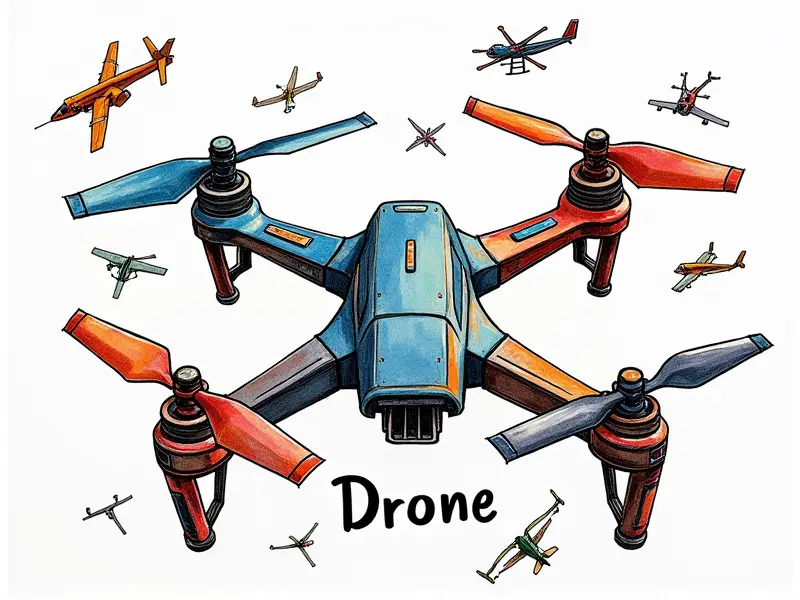Li-Po battery for FPV

Maximizing Flight Time with LiPo Batteries
Flight time is a critical factor in the success of any FPV drone operation. The right choice of battery can significantly extend your aerial adventures. Lithium Polymer (Li-Po) batteries are favored for their high energy density, allowing them to deliver more power per unit weight compared to other types like NiMH or Li-ion. This makes them ideal for FPV drones where every gram counts.
To maximize flight time with LiPo batteries, consider the following:
- Capacity (mAh): Higher capacity means more energy storage and longer flight times. However, remember that higher capacity also increases weight.
- Voltage (V): The voltage of your LiPo battery should match the requirements of your drone's motor and ESC (Electronic Speed Controller).
- C-rating: A higher C-rate allows for faster discharge, which is crucial if you need high power output during intense flight maneuvers.
Understanding C-Rating in LiPo Batteries
The C-rate of a battery indicates the rate at which it can be discharged relative to its capacity. For example, a 10C rating means that the battery can discharge at ten times its capacity without damaging itself or losing performance.
- Discharge Rate: The discharge rate is crucial for FPV drones as higher C-ratings allow for more power delivery during high-speed maneuvers and aggressive flying styles. However, excessive discharge rates can lead to battery degradation over time.
Best Practices for Charging LiPo Batteries
Proper charging techniques are essential to ensure the longevity of your LiPo batteries:
- Balanced Charging: Use a balanced charger that monitors and maintains consistent voltage across all cells. This prevents overcharging or undercharging individual cells.
- Charging Temperature: Charge batteries in an environment with stable temperatures, ideally between 20-30°C (68-86°F).
- Avoid Overcharging: Never leave a battery unattended during charging. Always set the charger to stop once the battery reaches its full charge.
LiPo Battery Safety Tips for FPV Flyers
Safety is paramount when dealing with LiPo batteries, especially in the high-energy environment of FPV flying:
- Proper Storage: Store batteries in a fireproof container or bag to prevent accidental fires.
- Balanced Charging: Regularly check and balance charge your batteries to ensure each cell is at the same voltage level.
- Avoid Overheating: Never fly or charge batteries in extreme temperatures. Heat can cause rapid discharge rates and potential battery failure.
Top Rated LiPo Batteries for FPV Drones
Selecting the right LiPo battery is crucial for optimal performance of your FPV drone:
- Gens Ace Tattu 1300mAh 7.4V 65C: Ideal for high-performance drones, offering excellent discharge rates and durability.
- Hobbywing 2200mAh 3S 80C: Designed specifically for FPV racing with high C-ratings to handle aggressive flying.
- Tattu R-Line 1500mAh 7.4V 65C: A reliable choice for FPV racers, providing consistent performance and longevity.
Optimizing Your FPV Drone with LiPo Batteries
To optimize your drone's performance, consider these factors when choosing a battery:
- Weight-to-Power Ratio: Opt for batteries that offer the best balance between weight and power output.
- Battery Placement: Strategically place the battery to enhance stability and aerodynamics of your drone.
- Voltage Compatibility: Ensure the battery voltage matches the requirements of your ESC and motor for optimal performance.
Maintaining LiPo Batteries for Longevity
To extend the lifespan of your LiPo batteries, follow these maintenance tips:
- Regular Inspection: Check for any signs of physical damage or swelling before each use.
- Storage Conditions: Store in a cool, dry place away from direct sunlight and heat sources.
- Battery Capacity: Regularly monitor battery capacity to ensure it hasn't degraded over time.
Selecting the Ideal Voltage for FPV LiPos
The voltage of your LiPo battery should be compatible with your drone's motor and ESC:
- Voltage Requirements: Consult the specifications of your drone components to determine the optimal voltage.
- Battery Series: Use a 3S (11.1V) battery for most FPV drones, but consider higher voltages like 4S (14.8V) for more powerful setups.
Balancing LiPo Batteries: Why It's Crucial
Balanced charging is essential to maintain the health and performance of your LiPo batteries:
- Voltage Consistency: Balanced chargers ensure each cell remains at an optimal voltage level, preventing overcharging or undercharging.
- Prolonged Lifespan: Regular balancing extends the overall lifespan of your battery pack by maintaining uniform charge levels across all cells.
Extending Lifespan of Your LiPo Batteries
To prolong the life of your LiPo batteries, adhere to these practices:
- Partial Discharge: Avoid fully discharging your battery; aim for a 30-70% state of charge (SOC).
- Avoid Overheating: Limit the use of high discharge rates that can cause excessive heat buildup.
- Regular Maintenance: Perform regular inspections and balanced charging to keep your batteries in optimal condition.
How to Charge and Store LiPo Batteries Safely
Safety is paramount when handling LiPo batteries, especially during charging and storage:
- Balanced Charging: Always use a balanced charger to monitor and maintain consistent voltage across all cells.
- Avoid Overcharging: Set your charger to stop once the battery reaches full charge to prevent overcharging.
- Safe Storage: Store batteries in a fireproof container or bag, away from flammable materials and direct sunlight.
By following these guidelines and best practices, you can ensure optimal performance, safety, and longevity of your LiPo batteries for FPV flying. Happy racing!

